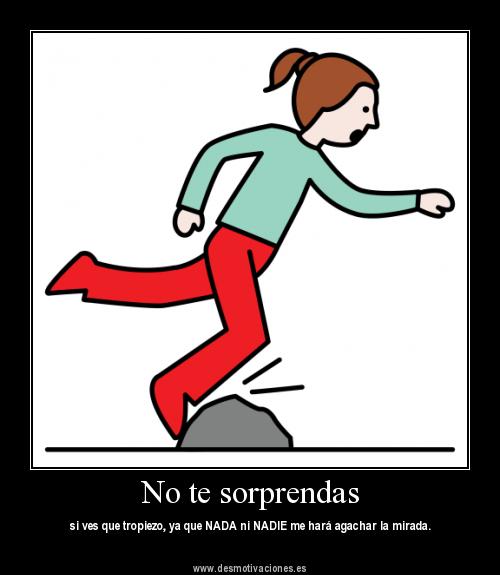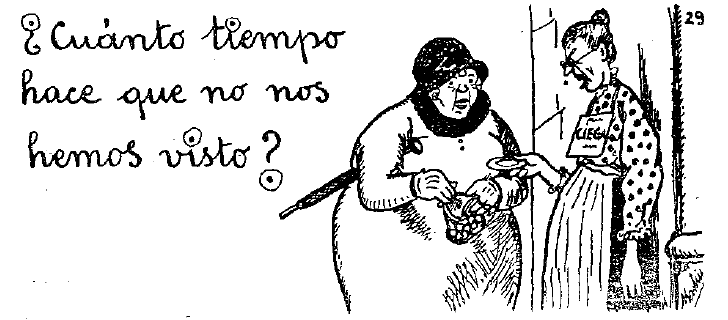
| Языки :: Испанский |
| Аудио |

 |
|
 |
|
83 |
Español |
Spanish |
|
Lección Veintinueve (29) |
||
| ¡Qué torpe estoy! (1) | How clumsy I am! | |
| 1 |
Llegaremos a Madrid cerca de las ocho, si el tren recupera su retraso (2). |
We shall arrive in Madrid about 8 o'clock, if the train makes up for [its] lost time. |
| 2 |
Está convenido que tomaremos un taxi juntos. Las señoras llevan poco equipaje (3). |
It's agreed that we shall take a taxi together [joined]. The ladies have little luggage. |
| 3 |
Vienen de San Sebastián, |
They come from San-Seb. |
| 4 | ¿Son ustedes parientes? pregunto. |
Are you related? I ask. |
| 5 |
¿Usted qué cree? responde doña Amelia. ¿Qué somos madre e hija, o tía y sobrina (5) ? |
And what do you think? answers doña Amelia.
That we are mother and daughter, or aunt and niece? |
| 6 |
Madre e hija no, puesto que ustedes no se tutean, digo; y pensando ser galante con doña Amelia (6), añado : |
Mother and daughter, no, since you don't say
tú to each other, I say; |
| 7 | Y porque usted no tiene edad para ser madre de doña Victoria. | And because you have not the age to be the mother of doña Victoria. |
| 8 |
¡Victoria! parece que el señor la cree (7) de una edad
respetable! exclama doña Amelia, riendo. |
Victoria! it seems that this gentleman believe
you [her] (to be) of a respectable age! exclaims doña Amelia laughing. |
| 9 |
He metido la pata. Intento disculparme, y al mismo tiempo me juro que nunca más hablará de edad delante de mujeres (8). |
I've put my foot (in it)! I try to exculpate myself, and at the same time I swear to myself that I shall never more speak of age before women. |
| EJERCICIOS | EXERCISE : | |
| 1 | ¿Cuánto tiempo hace que no nos hemos visto? | How long is it [h. much time does it make] since [that] we have not seen each other? |
| 2 | Cerca de dos meses; ¡cómo pasa el tiempo! | About two months; how time passes! |
| 3 | Y sus padres de usted, ¿están todavía en Inglaterra? | And your parents [his p. of his Honour] are still in England? |
| 4 | Sí, y yo vivo en casa de mi tío José
(pron. Hossy) ; ¿creo que usted le conoce? |
Yes, and I live at my uncle Joseph's; I think that you know him? |
| 5 |
No, pero su hijo Pablo es amigo mío; |
No, but his son Paul is a friend (of) mine; it is [makes] a long time since [that] I saw him. |
| 6 | Está muy ocupado, y sale poco. ¿Y usted qué hace? |
He is much occupied and goes out (very) little. And you, what do you do? |
| 7 | Nada; bien he intentado trabajar, pero no puedo; | Nothing. I have tried indeed to work, but I can't. |
| 8 | no quiero disimular delante de
usted, y confieso que el trabajo me aburre. |
1 will not dissemble before you, and I own that work bores me. |
| NOTES. | |
| 1 |
¡Qué torpe soy! would mean : how clumsy I am (naturally, deeply).
With estoy, the meaning is different : how clumsy I am (at times). |
| 2 | Llegar, to arrive; llevar, to carry. |
| 3 |
Está convenido : it is agreed; it's a thing that has just been
done, and is not unchangeable at all : está and not es. - A taxi: un taxi or un taxis. Two taxis : dos taxis. |
| 4 |
Pasaron, visitaron (hard s) : spent, visited : as in English, the preterite is a much used tense. |
| 5 |
¿ Qué cree usted? What do you think? - If one begins by usted,
it is emphasized. ¿ Usted qué cree? What do you think? - The son : el hijo (eeHo); the daughter : la hija (eeHa). - Notice that before a word beginning by stressed i or hi, and is : e and not y, for euphony. |
| 6 |
Ustedes no se tutean : "your Honours" do not say '"tú"
to each other. |
| 7 | ... la cree : thinks her (Honour), or with a repetition : la cree a usted. |
| 8 |
Meter la pata : same simile in English : to put
one's foot [paw] (in it). |
|
Relatives of all degrees, uncles, cousins, brothers-in-law,
etc. : los parientes. |
